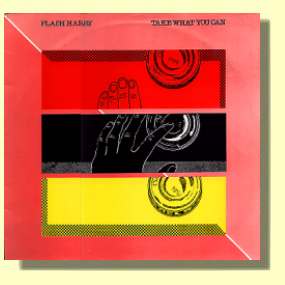Flash Harry
Take What You Can
Tracks: - Going Straight (3:13)
- Shame On You (5:29)
- She's So Crazy (2:53)
- Toe The Line (4:42)
- New Girl (2:58)
- Down At Marlene's (4:12)
- Evelyn (3:36)
- Television (3:05)
- Take What You Can (3:46)
- Another Way Out (3:25)
- Living With The Bright Boys (4:00)
Composed, produced and arranged by Keith Berel
Musicians: - Keith Berel: Lead electric, 12 string acoustic guitars, lead vocals, saxophone, flute
- Fred Knowles: Drums, percussion, backing vocals
- Mark Burdett: Electric & 12 string acoutic guitars, backing vocals
- Dieter Ebeling: Bass guitar, bass synth, backing vocals
Release information: 1982, A.D. Records (DTC 1000) Review:
During the early 80's a milkman's son and a couple of his mates started playing what was termed white man's reggae. Sting and the Police went on tobecome one of the biggest bands in the world in the mid 80's with thissound. In South Africa, Keith Berel (not sure what his father's professionwas) and some mates (including Fred Knowles who had played with earlyversions of the Climax Chicago Blues Band) started playing white SouthAfrican reggae. Flash Harry went on to become another in a growing list ofgreat SA bands who few remember today. Now where's the justice in that.
'Take What You Can' was FH's second album and contains 11 strong tracks ofedgy punk-tinged reggae and reggae-tinged rock featuring some masterfulguitar work (by Berel) and astute lyrics (also by Berel). From the bouncy'New Girl' to the punky 'Down at Marlene's' this album will have younodding appreciatively and tapping your feet. But it's not all bopping andgood times. While the tunes are uplifting, the lyrics are generally of amore serious nature.
Opening track 'Going Straight' is a good example starting with the phrase'Stay off the left side, Keep off the right - Going Straight'. On thesurface it's a song about a man living an average life, but the obviousdeeper meaning of not questioning things (particularly in apartheid SouthAfrica) is quite blatant. This is re-enforced with the line 'I depend onthe news, My wife makes me breakfast, and the boy shines my shoes'. Andthat's just one example. 'Toe the Line' and 'Television' contain furtherevidence of great lyrics.
After the demise of Flash Harry, Berel went on to release the highly rated,but hardly know 'Far Cry' under the guise of Carte Blanche and this, alongwith the 2 Flash Harry albums ('Going Straight' and 'Take What You Can')showcase the undoubtable songwriting skills of Berel.
As 'Take What You Want' was released during the height of apartheid, Iwould be loathe to say that Flash Harry were The Police of South Africa.Even if apartheid hadn't happened, I would still be loathe to say that as,despite also playing white reggae, Flash Harry were not Police clones. Theystamp their own sound on the album and don't sound derived. This strongsecond (and final) album from Flash Harry is a little masterpiece thatdemands a hearing. As the History of Contemporary Music of South Africaputs it, 'The songs are not there to be merely listened to, but to be explored.'
(John Samson - SA Rockdigest #132 November 2001)
Webpage: All info supplied by John Samson, May 2002.
South Africa's Rock Classics
South Africa's Rock Legends |